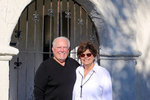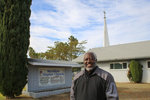


First appeared in The Baptist Paper, February 13, 2023 issue. Used with Permission.
As churches and other ministries seek to regain a sense of normal in the wake of the devastating COVID-19 pandemic, Mike Carlisle offers candid words of caution and challenge: There is no going back to the old normal. That means it’s time to chart a bold new course.
“Traditions are deep and steep,” noted Carlisle, director of missions for San Diego Southern Baptist Association. “I think the post-COVID strategy has to be a little bit different than it was previously.
“The road we’re going on, we’ve been traveling on for decades now,” said Carlisle, who formerly served as vice president of missions and mobilization of the North American Mission Board.
“We’ve been doing the same thing the same way, and I think God has allowed an interruption to that,” he pointed out. “If we keep doing what we’re doing, we’re going to keep getting what we got.”
Instead, Carlisle suggested, local congregations and ministry leaders “have to find a way to … reestablish who we really are. And we can do that with authenticity and genuine service and really stepping in to heal hurts.”
Rolland Slade, pastor of Meridian Baptist Church in El Cajon, California, and moderator of SDSBA, echoes Carlisle’s assessment.
Carlisle “brings a wide breadth of experience and vision and a heart to be … a convener of all of the levels and different leaders across the county together to the glory of God,” said Slade, who is also the immediate past chairman of the Southern Baptist Convention Executive Committee. “His leadership gives us an opportunity as an association of churches to … have an impact with the gospel beyond just the four walls of the church.”
Carlisle’s wife, Judy, serves alongside her husband as SDSBA’s director of operations. Describing mentoring as a vital step in effective evangelism and discipleship, she said, “That is my heartfelt calling to mentoring — women in particular. That’s been the emphasis wherever I’ve served on staff: mentoring, discipling, evangelism.”
For the Carlisles, Slade and other ministry leaders throughout the region, key aspects of achieving their ministry vision are found in their All San Diego ministry strategy and the related All America national evangelism emphasis.
“Our whole strategy in San Diego has been around the idea that we really want to serve people,” Carlisle explained. “We’ve discovered that all cities have three things in common. They’re all organized the same way.
“There’s a private, a public and a social sector,” he said. “The private is businesses, arts, entertainment, media. The public is government, military in San Diego, education. And then the social sector is faith communities, churches, etc. All of those sectors working together can make a difference.
“When you put all that together,” he affirmed, “you have a combination of people working together outside our boundaries in such a way that we can really see Kingdom impact if we don’t care who gets the credit for it.”
The overall strategy of All America and All San Diego involves five “finish lines” — prayer, compassion, evangelism, Bible engagement and Christian community.
“All San Diego is an entity to help us work together with other churches,” Carlisle shared. Noting that San Diego is both a border city and a port city, he said that setting “presents a really unique space to do ministry” with a variety of language, immigration and military issues to navigate.
“We’re all about trying to pull down the things that divide us,” Carlisle emphasized. “We wanted to be a place where the Kingdom of God could work together.”
On the local church level, Slade said, “The impact from COVID for us here at Meridian, truthfully, I see it as a blessing because we were able to step back and focus on our core ministries. We found out the most important thing was to stay in touch with our congregation and to really concentrate on those relationships. What were the needs of the people?
“By doing that, we were able to probably put away programs that we should have put away years ago,” he added. One practical example involved shifting the church’s traditional Wednesday fellowship meal to a meal delivery service for the congregation and area residents during the pandemic.
“It got to the point on Wednesday nights that people would be sitting in the window waiting for the pastor to come by,” Slade shared. “It just caused us to stop doing stuff that was causing us to get away from what it was we were supposed to do — caring for the congregation.
“When we did finally reopen fully, we saw some of those folks come to church … to worship because Meridian had become their church because we met a need — and it was just a simple dinner in a Styrofoam container in a plastic bag.”
Meshing his congregation’s ministry with All San Diego’s relational emphasis, Slade said, “I think what happened with All San Diego is now we’re considering relationships beyond just our own association.”
He said key questions include: “What’s our relationship with the school district? What’s our relationship with the police department and fire department, with businesses in the community? We’ve become more relationship focused rather than program focused.
“When we love on people, I think we’re really manifesting who Jesus is in our lives,” Slade declared. “As a result, I think our churches will be healthier. I think they’ll grow stronger. And I think there’ll be an opportunity for us to plant more churches and do more ministry than we had ever imagined before COVID.
Affirming that “we’ve decided as a group of pastors in this region that we’re going to work together,” Slade added, “We actually had a service together where we all signed a covenant that we weren’t going to speak ill of each other, that we’re going to have each other’s back, we’re going to pray for each other and we’re going to lift each other up. … It’s brought about a new sense of unity and Kingdom vision.”
Urging other churches and associations to “think creatively outside of the box,” Slade concluded, “Our marching orders have not been fulfilled, and we can’t quit because it’s really not about us today. It’s about the church tomorrow. It’s about the young people, the young families that will sit in the chairs that we’re sitting in today.”
To learn more about the All San Diego and All America ministry strategies, visit allsandiego.org and allamerica.org
Other items that may interest you
